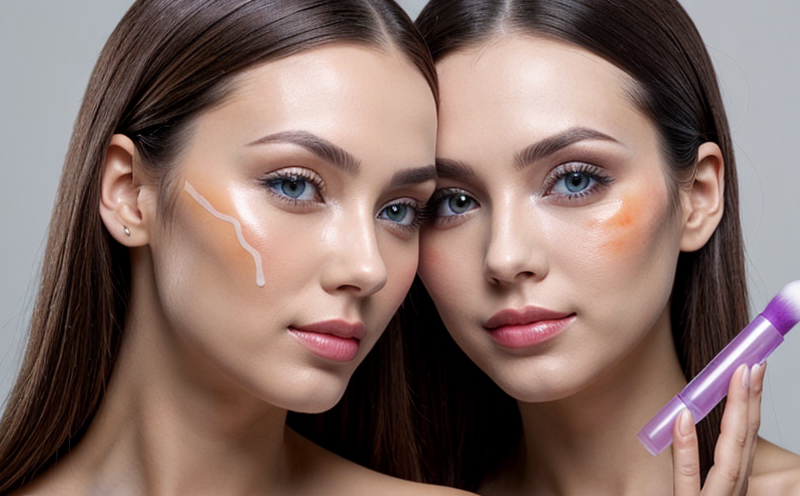Foundation Allergen Testing
The process of Foundation Allergen Testing is crucial in ensuring that cosmetic products, particularly foundations, are free from known allergens and harmful substances. This service aims to protect consumers by identifying potential triggers that could cause allergic reactions or irritation when using the product.
In the cosmetics sector, the quality of a foundation can significantly impact customer satisfaction and safety. Foundations are formulated with various ingredients including pigments, emollients, and preservatives. The challenge lies in ensuring these formulations do not include allergens such as nickel, cobalt, formaldehyde-releasing agents, or other substances that could cause adverse reactions.
Our laboratory uses state-of-the-art analytical techniques to perform comprehensive testing on cosmetic foundations. These tests ensure compliance with international standards such as ISO 21783 and EU Cosmetics Regulation (EC) No 1223/2009. The service covers a wide range of allergens that are known to cause allergic contact dermatitis, including:
- Nickel
- Cobalt
- Formaldehyde
- Balsam of Peru
- Parabens
The testing process begins with the collection and preparation of samples. Samples are taken from various batches to ensure a representative sample set is tested. Once collected, the samples undergo rigorous analysis using techniques such as Inductively Coupled Plasma Mass Spectrometry (ICP-MS) for metal content and Chromatography for preservative levels.
The results of these tests are detailed and comprehensive, providing insight into not only the presence or absence of allergens but also the concentration levels. This information is crucial for product developers to make informed decisions about ingredient changes and ensure compliance with regulatory requirements. For instance, if formaldehyde is detected above a permissible limit, corrective measures can be taken immediately.
By partnering with our laboratory, you gain access to expert knowledge and advanced technology that ensures your products meet the highest safety standards. This service not only protects your brand's reputation but also enhances consumer trust, leading to increased customer satisfaction and loyalty.
Benefits
The benefits of Foundation Allergen Testing extend beyond mere compliance with regulations. It plays a pivotal role in enhancing the safety profile of cosmetic products, thereby safeguarding consumer health and well-being.
- Avoids Legal Penalties: Non-compliance can lead to hefty fines and sanctions under various cosmetic regulations such as EU Cosmetics Regulation (EC) No 1223/2009. By performing thorough allergen testing, you ensure that your products meet all required standards.
- Builds Consumer Trust: In an era where transparency is key, consumers appreciate brands that prioritize safety and quality. A clean bill of health from a reputable laboratory can significantly boost brand image and consumer confidence.
- Enhances Product Reputation: Reliable testing results demonstrate your commitment to delivering safe and high-quality products, which in turn improves market reputation and customer satisfaction.
In addition to these tangible benefits, regular allergen testing helps in identifying potential risks early on. This proactive approach allows for timely corrective actions, preventing any adverse effects on consumers and minimizing the risk of product recalls or withdrawals from the market.
Quality and Reliability Assurance
The quality and reliability assurance in Foundation Allergen Testing are underpinned by our commitment to adhering strictly to international standards. Our laboratory is equipped with the latest analytical instruments and employs highly skilled technicians who adhere to stringent protocols.
We use a variety of testing methods including:
| Testing Method | Description |
|---|---|
| ICP-MS (Inductively Coupled Plasma Mass Spectrometry) | This method is used for the precise measurement of trace metal elements in cosmetic products. |
| HPLC (High Performance Liquid Chromatography) | Used to determine the presence and concentration of preservatives like parabens. |
The reliability of our testing is further enhanced by:
- Dedicated quality control personnel who monitor every step of the testing process.
- Regular calibration and validation of instruments to ensure accuracy and precision.
- Compliance with ISO/IEC 17025:2017 accreditation, ensuring our laboratory meets the highest standards for technical competence.
The combination of advanced technology and meticulous adherence to protocols ensures that our testing results are accurate, reliable, and repeatable. This commitment to quality and reliability is what sets us apart in the industry.
Use Cases and Application Examples
| Use Case | Description |
|---|---|
| Ingredient Development | In the early stages of product development, allergen testing helps identify potential allergens in raw materials or formulated products. |
| Production Line Monitoring | During production, regular sampling and testing ensure that each batch meets safety standards without introducing new allergens. |
- New Product Launch: When launching a new cosmetic foundation product, thorough allergen testing is essential to ensure it complies with international regulations. For example, a launch in the EU requires compliance with Regulation (EC) No 1223/2009.
- Batch Consistency: Ensuring that each batch of foundation produced meets the same safety standards is crucial for maintaining product consistency and customer trust. Testing at the end of production ensures that all batches are free from allergens.
In addition to these specific use cases, allergen testing also plays a vital role in troubleshooting issues during the manufacturing process. If an allergic reaction is reported by consumers, our laboratory can conduct detailed investigations to identify and rectify any potential allergens in subsequent batches.





